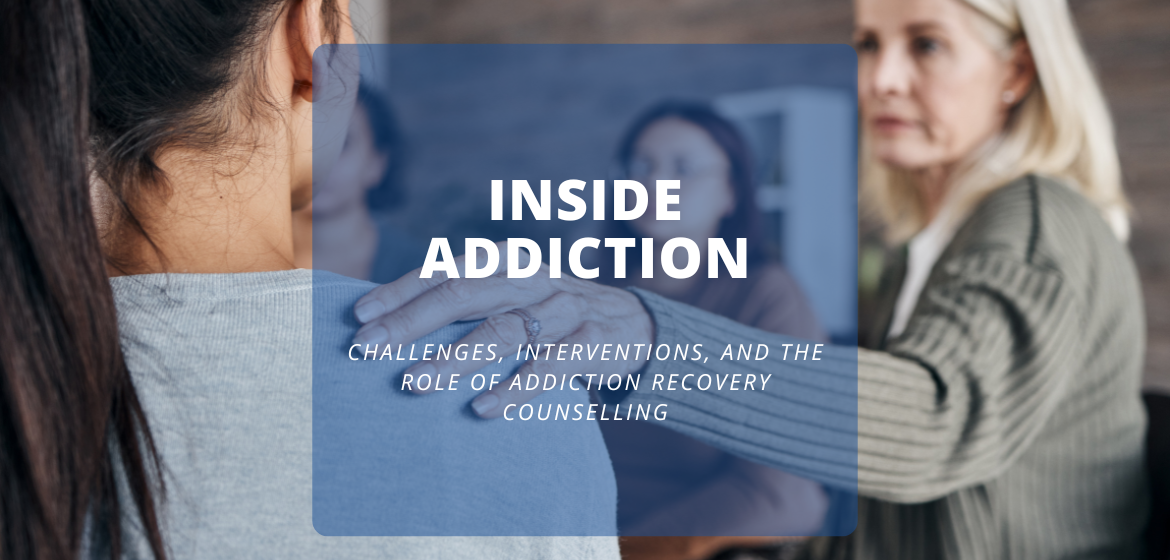
Inside Addiction: Challenges, Interventions, and the Role of Addiction Recovery Counselling
Addiction continues to be one of the most pressing social and public health issues of our time. Whether it’s substance misuse, behavioural dependencies, or the growing concerns around digital addiction, the ripple effects extend far beyond the individual, impacting families, communities, and wider support systems.
Understanding addiction is not just about recognising harmful behaviours. It’s about exploring the psychological, social, emotional, and physiological factors that drive and sustain those behaviours and, importantly, it’s about equipping people with the tools and support they need to heal. This is where trained, compassionate, and highly skilled professionals come in the role of addiction recovery counselling.
What Is Addiction?
Addiction is broadly defined as a chronic condition marked by a person’s inability to stop using a substance or engaging in a behaviour despite harmful consequences. Traditionally associated with drugs and alcohol, addiction is now recognised in many forms, including gambling, gaming, shopping, and even work or exercise.
From a clinical standpoint, addiction is both a psychological and physiological process. Over time, the brain’s reward system is altered, and compulsive behaviours become more ingrained. The result? A pattern that’s difficult to break without targeted intervention and sustained support.
However, it’s essential to understand that addiction rarely exists in a vacuum. Many individuals facing addiction also struggle with mental health conditions such as depression, anxiety, or trauma. This dual diagnosis underscores the need for holistic and evidence-based approaches to treatment and recovery.
The Human Cost of Addiction
Beyond the clinical definitions and data, addiction has a very real and human cost. In Ireland, the Health Research Board reports consistent increases in treatment for drug-related issues. Communities affected by poverty and marginalisation often experience higher rates of addiction and lower access to support services. Families can find themselves in cycles of crisis, with loved ones caught between shame, fear, and helplessness.
The stigma that still surrounds addiction also prevents many from seeking help early. This can delay recovery and, in some cases, lead to tragic outcomes. One of the most powerful roles a counsellor can play is in breaking down these barriers — offering empathy, non-judgmental listening, and a roadmap toward healing.
Evidence-Based Intervention: A Key to Recovery
Modern addiction counselling has evolved far beyond talk therapy. It now incorporates a range of evidence-based interventions designed to address addiction at multiple levels — individual, family, and community.
Cognitive Behavioural Therapy (CBT), Motivational Interviewing, and trauma-informed approaches are just a few of the models used. These strategies help individuals recognise patterns, reframe thinking, build coping mechanisms, and make meaningful changes over time.
But theory is only part of the equation. Practical, real-world experience — including supervised placements — is essential for professionals who want to work effectively with complex cases and in diverse settings.
The Role of Addiction Recovery Counselling
Professional addiction counsellors work in a wide range of settings: community organisations, treatment centres, hospitals, mental health services, schools, prisons, and private practice. They do more than offer one-on-one counselling, they educate, advocate, and create change at policy and systems levels.
To do this effectively, counsellors need deep theoretical knowledge, practical skills, emotional resilience, and cultural sensitivity. They must be capable of navigating sensitive issues like trauma, domestic abuse, homelessness, and mental health, all of which can intersect with addiction.
This is why the demand for qualified, highly-trained professionals continues to grow.
Why Study the M.A. in Addiction Counselling at ICHAS?
The M.A. in Addiction Counselling at ICHAS is designed specifically for those who want to lead change in addiction services.
Key features of the programme include:
- QQI-accredited, meeting national standards for quality, ethics, and academic rigour
- Eligibility to pursue professional accreditation with Addiction Counsellors Ireland
- Blended learning delivery, attend classes online or on campus in Limerick or Dublin
- Modular and part-time structure, making it ideal for working professionals
- Access to expert lecturers and a supportive learning environment
- A pathway to doctoral-level studies
The Path Ahead
Addiction will remain a challenge for our communities. But with the right tools, we can be part of the solution.
Empathy, education, and evidence-based practice are the cornerstones of recovery. By pursuing postgraduate study in the field of addiction recovery counselling, you’re not only investing in your career, you’re contributing to a more informed, compassionate, and healthier society.
Learn more about our range of addiction courses at ICHAS and take your next step in becoming a leader in this critical area of mental health.






















